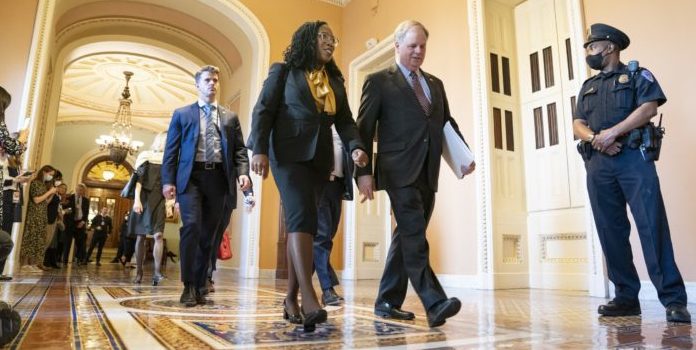(Headline USA) The Supreme Court is taking up an Alabama redistricting case that could have far-reaching effects on state sovereignty concerning the constitutionally enshrined process of determining their own voting districts.
It won’t be the first time it has grappled with the issue. Following the 2016 election, the court heard lawfare challenges from activist groups, led by Eric Holder’s National Democratic Redistricting Committee, that ultimately determined states could not use race as a factor in redrawing their districts under the provisions of the federal Voting Rights Act.
The court subsequently said, however, that it lacked the authority to rule on partisan-based gerrymandering, punting the issue back to individual states.
In the upcoming case, it will again revisit race-based gerrymandering but from another angle—to determine whether its earlier ruling would apply when the new districts would work to the benefit, instead of to the detriment, in crafting a bloc of dedicated black voters in Alabama’s so-called Black Belt.
The justices are hearing arguments Tuesday in the lawsuits seeking to force Alabama to create a second black=majority congressional district. About 27% of Alabamians are black, but they form a majority in just one of the state’s seven congressional districts.
The court voted 5-4 in February to block a lower court ruling that would have required a second black majority district in time for the 2022 midterm elections.
A similar ruling to create an additional black majority district in Louisiana also was put on hold.
The court previously rejected activists’ efforts to invoke the Voting Rights Act in 2013 and 2021. A ruling last year signaled that the Civil Rights-era law targeting segregationist Southern states was obsolete in the current political landscape.
Another ruling against them, in favor of the GOP-led state, could permanently cap attempts to use the act as a way to target red states for extra scrutiny. But that outcome is far from certain.
Two appointees of President Donald Trump were on the three-judge panel that unanimously held that Alabama likely violated the landmark 1965 law by diluting black voting strength.
The judges found that Alabama has concentrated black voters in one district, while spreading them out among the others to make it impossible for them to elect a candidate of their choice.
Alabama’s black population is large enough and geographically compact enough to create a second district, the judges found.
The state argues that the lower court ruling would force it to sort voters by race, insisting that it is taking a “race neutral” approach to redistricting.
That argument could resonate with conservative justices, including Chief Justice John Roberts. He has opposed most consideration of race in voting both as a justice and in his time as a lawyer in Republican presidential administrations.
Tuesday’s arguments are the first Supreme Court case involving race for Justice Ketanji Brown Jackson, the first black female justice.
A challenge to affirmative action in college admissions is set for arguments on Oct. 31.

